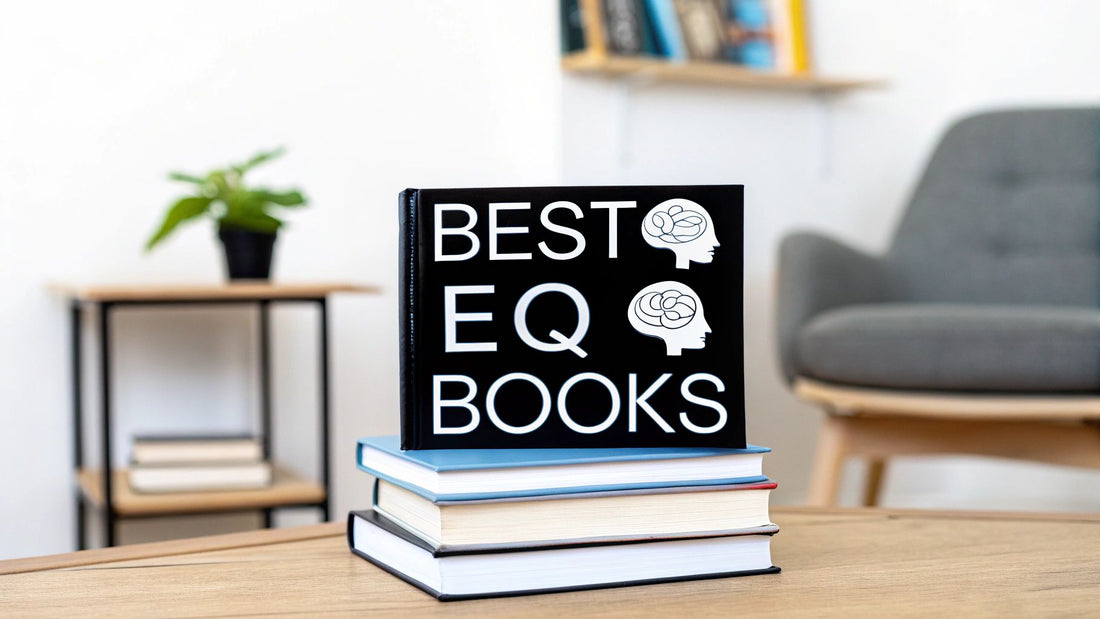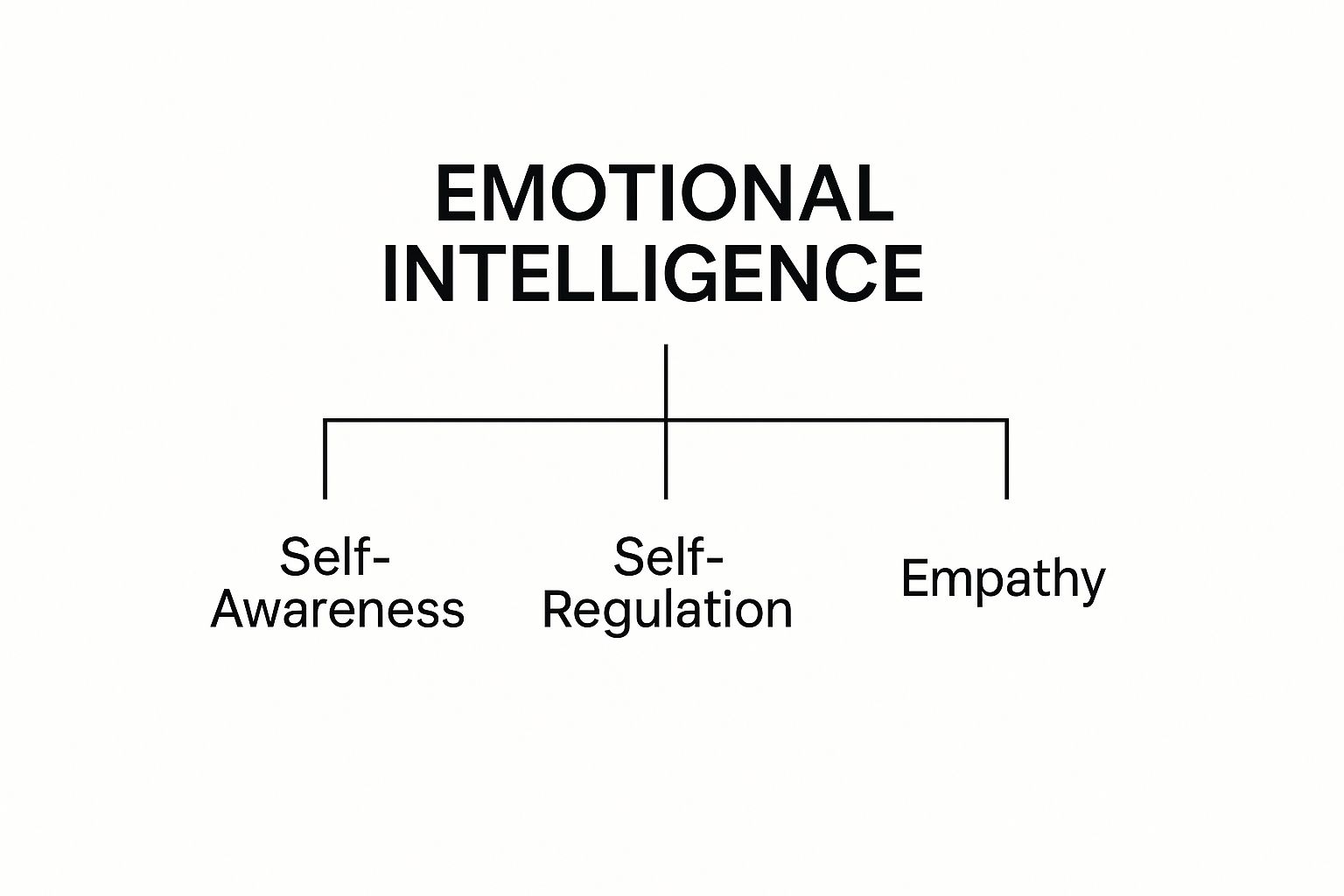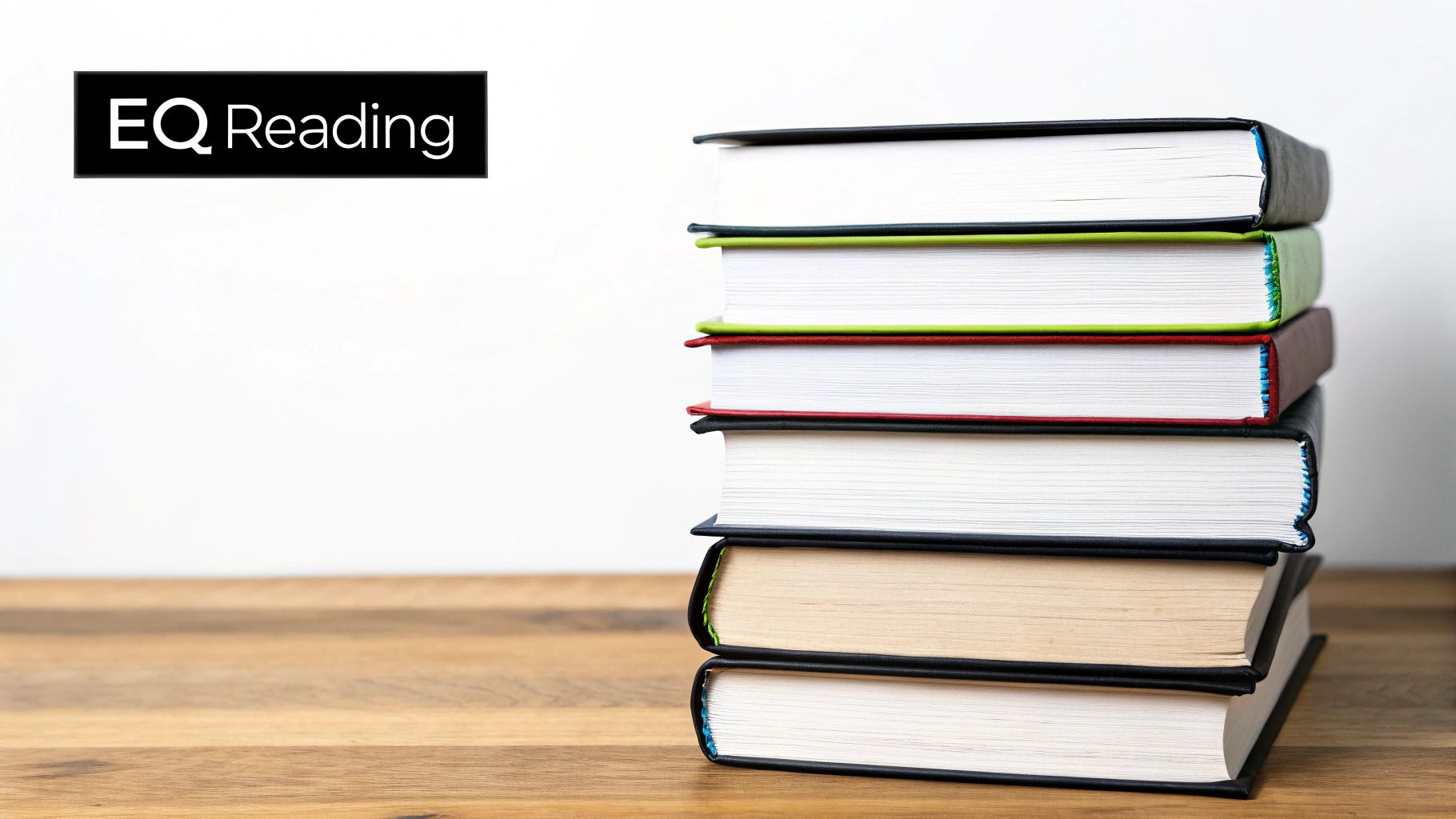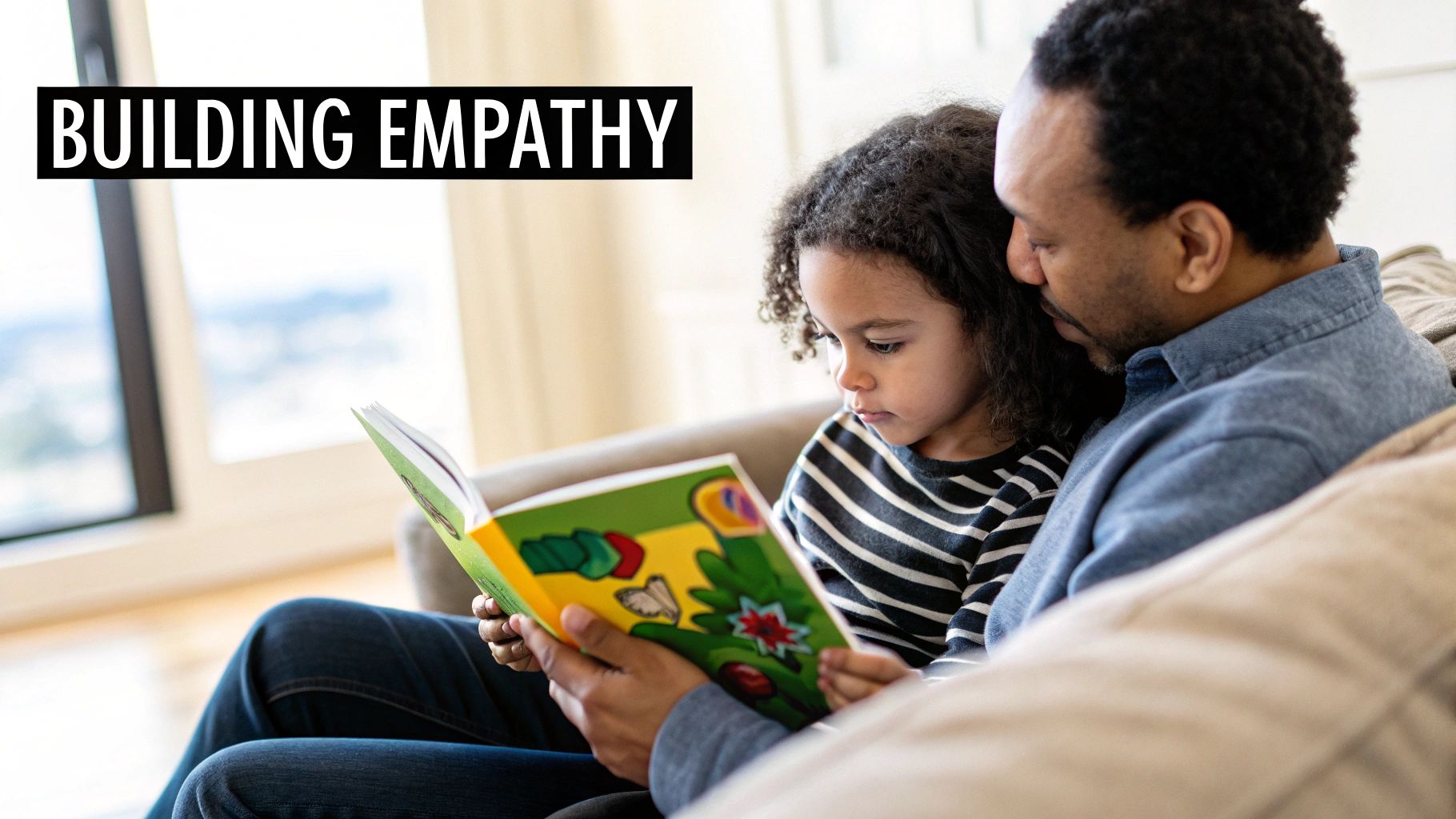
The Best Books for Emotional Intelligence
Share
The best books for emotional intelligence aren't just dry theory. They offer real, practical frameworks and relatable stories that help you get to grips with your own feelings, while also learning to understand and connect with others. Think of them less as self-help guides and more as powerful tools for building resilience, deepening relationships, and navigating an increasingly complex world.
Why Emotional Intelligence Is a Crucial Skill Today

In a world buzzing with digital noise and relentless pressure, emotional intelligence (or EQ) has shifted from a ‘nice-to-have’ trait into an essential life skill. It’s that quiet power that helps you recognise a surge of frustration in a traffic jam, and then choose not to let it wreck your day. For example, instead of honking the horn, you take a deep breath and put on some calming music. It’s also the empathy to see a colleague is stressed and offer support instead of criticism.
This skill is the foundation of all strong relationships, both personal and professional. People with a high EQ tend to be better communicators, more effective leaders, and far more resilient when life throws a curveball. They don’t just react to the world; they respond to it with thought and care.
The Growing Need for Mental Resilience
Thankfully, the conversation around mental health is becoming more open, but the challenges are still very real. Here in the UK, worries about the mental wellbeing of children and young people are especially pressing. The constant demands of social media, academic expectations, and an uncertain future can take a serious toll. The pressure to present a 'perfect' life online, for instance, can lead to feelings of inadequacy and anxiety when a young person's reality doesn't match the curated images they see.
Recent NHS figures paint a worrying picture, with one in five children and young people in England aged 8 to 25 having a probable mental health problem in 2023. Addressing this is not just important; it's vital for their future development. Building emotional intelligence is one of the most proactive ways to create a strong foundation for mental wellbeing. It gives young people the tools to:
- Identify and name their feelings, which is always the first step toward managing them.
- Develop empathy, helping them build supportive and healthy friendships.
- Build resilience, so they can bounce back from disappointments and setbacks.
The stakes are just as high for adults. Poor emotional regulation can lead to burnout, strained relationships, and a nosedive in job satisfaction. The cost of mental health struggles on UK businesses is huge; a 2022 Deloitte report estimated it costs employers up to £56 billion per year due to absence, presenteeism, and staff turnover. In short, investing in your EQ is a direct investment in your long-term happiness and stability.
Reading as a Path to Greater EQ
So, where do you start? One of the most accessible and effective ways to build this vital skill is simply by reading. The right books for emotional intelligence can act as a personal guide, sharing insights from psychologists, researchers, and storytellers who have spent their lives trying to understand human emotion.
These books give us frameworks that help demystify our inner worlds. They’re full of practical examples that allow us to see our own behaviours in a new light, and they offer actionable tips and strategies to put that knowledge into practice. This journey often begins with the core ideas of social and emotional learning, which you can dive into in our guide on what is social and emotional learning.
The growing focus on these skills is clear. The UK's social and emotional learning (SEL) market was valued at $184.2 million in 2023 and is projected to climb to an incredible $706.1 million by 2030. This shows a real commitment from educators and organisations to nurture these essential human skills.
Important Disclaimer
Please note that I am not a mental health professional. The information provided in this article is for educational and informational purposes only and should not be considered a substitute for professional medical advice. If you are worried about your own mental health or that of someone else, please seek help from a doctor or a qualified mental health practitioner.
Understanding the Five Pillars of Emotional Intelligence
Before you start filling your bookshelf, it helps to know what you’re actually trying to build. Think of emotional intelligence less as a single, vague skill and more like a structure held up by five distinct pillars. Once you get a feel for these core ideas, you’ll be able to pick out books that really zero in on the areas you want to strengthen.
As the diagram shows, it all starts with what’s going on inside us. The pillars of Self-Awareness, Self-Regulation, and Empathy are the true foundation of emotional intelligence.

This really brings home the idea that you have to get a handle on your own internal world before you can truly connect with others.
Self-Awareness
This is the absolute bedrock of EQ. Self-awareness is your ability to see yourself clearly—to recognise your emotions as they happen, understand your strengths and weaknesses, and know what you truly value. It’s about connecting the dots between what you feel and why you feel it, and how that shapes your actions.
For instance, a self-aware person might feel that familiar knot in their stomach just before a big presentation. Instead of pushing through or ignoring it, they can pause and think, "Ah, that's nervousness." Just naming it gives them power over it, allowing them to take a few deep breaths and get centred instead of letting the anxiety quietly sabotage their performance.
Without self-awareness, you’re flying blind. It’s almost impossible to manage your emotions or understand anyone else's if you don’t know what’s going on with you first. Research has found something pretty startling: while 95% of people believe they are self-aware, the truth is that only 10–15% actually are. That gap shows just how vital it is to actively work on this foundational skill.
Self-Regulation
Once you can spot your emotions, the next step is to manage them. Self-regulation is all about controlling your emotional responses and impulses. This isn’t about bottling things up or pretending you don’t have feelings. It’s about choosing a thoughtful response instead of having a knee-jerk reaction.
Picture this: you get a frustrating email from a colleague that feels completely unfair. The impulsive thing to do? Fire back a defensive, angry reply. But self-regulation is the pause button. It lets you recognise the anger, take a step back, and decide to wait until you’re calmer to draft a response that’s professional and actually solves the problem. It’s a game-changer for keeping relationships intact and making clear-headed decisions under pressure.
Motivation
This pillar is the internal engine that keeps you going. Intrinsic motivation is what drives you to chase your goals with grit and optimism, even when things get tough. It’s a push that comes from within, for reasons that go far beyond a pay cheque or a fancy title. This kind of motivation is fuelled by a real passion for what you do and a deep-seated desire to grow.
Someone with strong internal motivation will keep plugging away at a difficult project because they believe in its purpose and genuinely enjoy the challenge. They don't see failure as a personal failing; they see it as a lesson. This resilience is what separates people who give up from those who ultimately succeed.
Empathy
While the first three pillars are all about looking inward, empathy is where you turn your focus outward. Empathy is the ability to understand and share the feelings of another person. It’s about genuinely trying to put yourself in their shoes and see the world from their point of view.
A simple example is seeing a teammate stressed about a tight deadline, even when your own plate is clear. Instead of being dismissive, an empathetic person might offer to help or simply lend a listening ear, saying, "You look like you're under a lot of pressure. Can I grab you a coffee or take something off your plate?"
Empathy isn’t just about imagining how you would feel in someone’s situation. It's about trying to understand how they actually feel. That small shift is the key to real connection.
Building empathy makes all your relationships stronger, improves teamwork, and just makes the world a kinder, more supportive place to be.
Social Skills
The final pillar, social skills, is where everything comes together. This is about using your understanding of your own emotions and others' to build relationships and networks effectively. It covers everything from clear communication and resolving conflict to inspiring and influencing the people around you.
Someone with great social skills can handle tricky conversations with grace, give constructive feedback that doesn't cause offence, and build rapport with almost anyone. They are fantastic collaborators because they get the human element of working together, which often makes them natural leaders and trusted members of any team.
To pull it all together, here’s a quick overview of how these five pillars work in the real world.
The Five Pillars of Emotional Intelligence at a Glance
| Pillar | What It Means | A Practical Example |
|---|---|---|
| Self-Awareness | Knowing your own emotions, strengths, and weaknesses. | Noticing you feel irritable because you skipped lunch, not because your colleague is annoying. |
| Self-Regulation | Managing your emotional reactions and impulses. | Pausing before responding to a provocative comment in a meeting to collect your thoughts. |
| Motivation | Having an internal drive to achieve goals and persevere. | Staying late to finish a project you’re passionate about, even without extra pay. |
| Empathy | Understanding and sharing the feelings of others. | Recognising a friend is disappointed about a cancelled plan and offering genuine sympathy. |
| Social Skills | Building rapport and managing relationships effectively. | Skillfully navigating a disagreement between two team members to find a middle ground. |
By seeing emotional intelligence as these five interconnected skills, it becomes much easier to identify where you’re strong and where you might have room to grow.
Essential Emotional Intelligence Books for Adults

Diving into the world of emotional intelligence can feel a little overwhelming at first. The good news is, the right books act as brilliant guides on your journey. Think of them less as textbooks and more as toolkits, filled with practical advice and genuine insights.
We’ve picked out a few foundational titles that offer a clear path to boosting your EQ. These aren't just any self-help books; they are grounded in solid research and real-world experience, making them essential reading for anyone serious about personal and professional growth.
Emotional Intelligence by Daniel Goleman
Often seen as the book that started it all, Daniel Goleman’s Emotional Intelligence is a must-read. Goleman, a psychologist and science journalist, is the one who really brought the concept of EQ into the mainstream. He made a compelling case that it can be far more important than IQ for finding success in life.
Who is it for? This book is perfect for anyone new to the idea of emotional intelligence. It’s also invaluable for leaders, managers, and educators who want to get to grips with the science behind why empathy and self-awareness are such critical skills in the workplace.
Key Insight: Goleman breaks down the five core pillars of emotional intelligence, showing how they pop up in everything from our relationships to our careers. His work essentially gives us the language to understand and talk about these complex internal skills.
The link between a high EQ and professional success is undeniable. UK research consistently shows a strong connection, and global studies back this up: a staggering 90% of top performers in high-pressure jobs have above-average emotional intelligence. What's more, emotionally intelligent leaders can boost their organisation's growth by 7% and profits by 29%. If you're looking for more on this, you can explore the data on how emotional intelligence drives performance on salesman.com.
Daring Greatly by Brené Brown
Brené Brown is a research professor whose work on vulnerability, courage, and shame has struck a chord with millions. While Daring Greatly isn't strictly an EQ book, its core message is deeply tied to self-awareness and empathy.
Brown argues that vulnerability—that feeling of showing up and being seen when you can’t control the outcome—is where connection, creativity, and love are born. That takes a huge amount of emotional courage.
Who is it for? This is an essential read for anyone who struggles with perfectionism, a fear of failure, or that nagging inner critic. It's also a fantastic resource for leaders hoping to build a culture of trust and innovation within their teams.
"Vulnerability is not winning or losing; it's having the courage to show up and be seen when we have no control over the outcome. Vulnerability is not weakness; it's our greatest measure of courage."
Key Insight: True emotional intelligence means being honest about our feelings, even the messy ones like fear and uncertainty. By learning to embrace vulnerability, we build deeper connections with others and develop the resilience needed to handle whatever life throws at us.
Putting Insights into Practice
Of course, just reading these books for emotional intelligence is only the first step. To make the knowledge stick, you have to actually apply it. Here are a couple of practical exercises inspired by these authors to get you started.
1. A Mindfulness Exercise for Self-Regulation
Inspired by Goleman's focus on managing our impulses, this simple mindfulness practice helps create a bit of space between a trigger and your reaction.
- Find a quiet spot: Just sit comfortably for two minutes. That's it.
- Focus on your breath: Notice the sensation of air entering and leaving your body. Don’t try to change it, just observe it.
- Acknowledge thoughts: Your mind will wander—that’s what minds do. When it happens, gently note the thought without judging it, and then guide your focus back to your breath.
Doing this daily builds the mental muscle you need to stay calm under pressure.
2. A Journaling Prompt for Self-Awareness
Brené Brown’s work is all about getting curious about our emotions. Use this journaling prompt to build a stronger connection to your inner world.
- Think about a recent situation where you felt a strong emotion—anger, joy, disappointment, anything.
- Write down the story you immediately told yourself about what happened. What were your thoughts? What assumptions did you make?
- Now, challenge that story. Is there another way to look at the situation? What might the other person have been feeling or thinking?
This little practice helps you separate your emotional reaction from the objective facts, which is a core part of self-awareness. It's a simple but powerful way to start applying the lessons from the best books for emotional intelligence.
Nurturing EQ in Children and Teenagers

Giving a child the tools to understand their own emotions is one of the most powerful gifts we can offer. With growing concerns around youth mental health here in the UK, helping children and teenagers learn how to manage their feelings has never been more vital. Think of it as building an emotional foundation—one that helps them become resilient, form healthier relationships, and navigate all the curveballs life will inevitably throw their way.
Early support makes a world of difference. When we introduce ideas like empathy and self-awareness from a young age, we’re essentially giving them an emotional vocabulary. It's not about shielding them from feeling sad or angry, but about teaching them to recognise those feelings for what they are and respond in a constructive way.
This is especially important in a world dominated by social media, which often paints a filtered, unrealistic picture of life that can really knock a young person's self-esteem. Emotional intelligence acts like a protective buffer, helping them build a stronger sense of self and view the digital world with a more critical eye.
Age-Appropriate Books for Younger Children
For little ones, the journey into emotional intelligence starts with simple stories and characters they can connect with. Picture books are perfect for this. They gently introduce big ideas in an engaging way, creating a safe space to explore feelings without it all becoming too much.
These books tend to focus on a few core areas:
- Naming Emotions: Helping kids find the words for what they're feeling, whether it's "frustrated," "excited," or "disappointed."
- Understanding Others: Stories showing characters with different points of view are brilliant for building the early blocks of empathy.
- Simple Problem-Solving: Narratives that show a character working through a disagreement or a tricky feeling can be really helpful.
To create a truly supportive environment, it's also worth understanding the many play-based learning benefits for kids, as play is one of the most natural ways children develop their social and emotional skills.
Guiding Teenagers Through Complex Emotions
As children enter their teenage years, their emotional worlds expand and get a lot more complicated. Suddenly, they're juggling academic stress, peer pressure, and the huge task of figuring out who they are. The right books for emotional intelligence can act as a trusted guide through this turbulent time.
For this age group, you’ll want to look for titles that dig a bit deeper into themes like:
- Managing Anxiety: Books offering practical strategies, like mindfulness or cognitive reframing, to help them cope with anxious thoughts.
- Building Resilience: Stories about overcoming challenges can be incredibly inspiring, showing teens that setbacks are just a normal part of growing up.
- Navigating Social Dynamics: Guides that help them make sense of friendships, conflict, and the importance of setting healthy boundaries.
Using Books as Conversation Starters
The real magic happens when a book opens the door to a good conversation. Reading together, or just chatting about a book they've read on their own, can create a wonderful opportunity to connect. Rather than firing direct questions at them, try a more open-ended approach.
You could ask things like, "How do you think the character felt when that happened?" or "Have you ever felt a bit like that?" This creates a safe space for them to share their own experiences without feeling put on the spot.
By weaving these chats into everyday life, you make talking about feelings a completely normal thing. If you’re looking for some great titles to get you started, have a browse through our handpicked list of books about emotional intelligence.
Of course, it’s important to remember I’m not a mental health professional. If you are ever worried about a child's wellbeing, please reach out to a doctor or a qualified specialist. The goal is to build a supportive home where asking for help is always seen as a sign of strength.
Putting Knowledge into Practice to Build Your EQ
Absorbing the wisdom from books for emotional intelligence is a fantastic start, but the real change happens when you close the book and get to work. Knowledge gives you the map, but it's consistent practice that builds the new pathways in your brain, turning theory into something you just do. The end goal is to weave these ideas into your daily life until they feel as natural as breathing.
This isn't about making massive, life-altering changes overnight. Far from it. It's about the small, intentional actions you repeat every day. It’s choosing to pause for a few seconds before firing back a reply to a frustrating email. It’s making a real effort to listen to a friend without just waiting for your turn to speak. These tiny habits are the real building blocks of a higher EQ.
From Theory to Action: A Practical Toolkit
Turning those brilliant insights from a book into actual habits needs a bit of a plan. Here are a couple of practical exercises, inspired by the core ideas of emotional intelligence. Pick one that feels right and give it a go for a week.
1. The Active Listening Challenge
This is a game-changer for sharpening your empathy and social awareness. For your next important conversation, make a commitment: listen to understand, not just to reply.
- Paraphrase and Clarify: After the other person has spoken, try saying something like, "So, if I'm hearing you right, you're feeling..." This shows you’re properly engaged and gives them a chance to clear up any confusion.
- Notice Non-Verbal Cues: Pay attention to their body language and tone. Do their words line up with their expression?
- Withhold Judgement: Just focus on seeing things from their side, even if you don't agree. The goal here is understanding, not winning an argument.
2. Trigger Tracking Journaling
This simple journaling technique is brilliant for boosting self-awareness and learning to manage your reactions. All you need is a notebook to jot down moments when you feel a strong emotional surge.
- What was the trigger? Be specific. Was it a particular comment, a stressful meeting, or maybe just a thought that popped into your head?
- What was the emotion? Give it a name. Was it anger, embarrassment, anxiety, or something else entirely?
- How did I react? Write down what you did and how you felt physically. Did your heart race? Did you snap at someone?
- What could I do differently next time? This last step is crucial. It helps you come up with a better plan for when it happens again.
Connecting EQ to the Professional World
Working on your emotional intelligence isn't just a personal project; it has a huge impact on your work life and the health of a business. Poor mental health in the workplace comes with a heavy price tag, showing up as more sick days, lower productivity, and people leaving their jobs.
When leaders and their teams start to cultivate a higher EQ, the whole workplace culture can shift for the better. A review of training practices found that structured EQ development—often kick-started by good books and supported by ongoing coaching—leads to real, measurable improvements. Companies that use regular emotional intelligence check-ins and provide reading lists often see better client satisfaction, higher staff retention, and even improved sales. It’s solid proof that putting knowledge from books into a structured practice really pays off.
Building EQ in a team is a proactive strategy. It creates a more resilient, communicative, and psychologically safe environment where people can do their best work. This directly addresses the root causes of burnout rather than just managing the symptoms.
Of course, beyond the office, applying your EQ can make a world of difference in your personal connections. For example, you can learn to boost your bond with emotional intelligence in relationships.
Simple Relaxation and Mindfulness Tips
Self-regulation is a cornerstone of EQ, and mindfulness is one of the most powerful ways to build it. Here are a few simple tips to sprinkle some calm into your day, helping you manage stress and stay centred.
- The 4-7-8 Breathing Technique: Breathe in quietly through your nose for four seconds, hold your breath for seven seconds, and then exhale completely through your mouth for eight seconds. Repeating this just three or four times can instantly calm your nervous system.
- A Five Senses Check-In: When you feel overwhelmed, just pause. Name five things you can see, four things you can touch, three things you can hear, two things you can smell, and one thing you can taste. It’s a simple trick to ground you in the present moment.
- Wear Your Reminders: Sometimes a physical cue can be a powerful nudge to stay mindful. Mental health apparel, like a hoodie with a positive message, can act as a personal prompt to check in with yourself as you go about your day.
The great thing is, these principles are universal and can be adapted for all ages. If you're looking for ways to share these ideas with the little ones in your life, have a look at our guide on emotional intelligence games for kids.
A Gentle Reminder: As you explore these practices, remember that I am not a mental health professional. This advice is for educational purposes. If you are ever worried about your mental health, please seek help from a doctor or a qualified therapist. They can provide the professional support you need.
Got Questions? We’ve Got Answers
Diving into the world of emotional intelligence can bring up a few questions. That's completely normal. To help you feel more confident, I've put together some straightforward answers to the queries I hear most often.
Think of this as a friendly chat to clear up any uncertainties as you find the best books for emotional intelligence and start putting what you learn into practice.
How Do I Choose the Right Book for Me?
A great place to start is to ask yourself what you're hoping to improve. Think about the five core areas of emotional intelligence: are you looking to understand your own feelings better (Self-Awareness), get a handle on your reactions (Self-Regulation), find your drive (Motivation), feel more connected to others (Empathy), or build stronger relationships (Social Skills)?
If you’re often unsure why you feel a certain way, a book focusing on self-awareness could be a game-changer. If you want to get on better with colleagues, look for something centred on empathy and social skills. Our guide links each book to specific goals, so that’s a brilliant starting point. Don't forget to read a few online reviews, too—sometimes finding an author whose style just clicks with you makes all the difference.
Can a Book Really Improve My Emotional Intelligence?
Yes, absolutely—but it’s crucial to see reading as the first step, not the final one. A book gives you the knowledge, the frameworks, and often the inspiration to get going. The real growth happens when you take those ideas off the page and apply them in your day-to-day life.
It's a bit like learning to play the guitar. You can read all the music theory in the world, but you only become a musician when you actually pick up the instrument and practise. Use the exercises in these books to pause before you react, consciously consider someone else’s perspective, and notice your own emotional triggers. Practice is what turns theory into a real, tangible skill.
It is crucial to remember that while books are excellent for self-development, they are not a substitute for professional medical advice. If you are worried about your mental health, please speak to a doctor or a qualified therapist who can provide the right support.
What if I Can't Stand Self-Help Books? Are There Other Options?
Definitely. If the traditional self-help style makes you cringe, there are plenty of other ways to explore emotional intelligence. Many people find that books grounded in neuroscience or backed by extensive research appeal more to their analytical side.
Biographies of great leaders can also be fantastic case studies, showing emotional intelligence in action out in the real world. Even fiction is a powerful tool for building empathy. When you get lost in a novel, you’re stepping into the minds and hearts of different characters, which is a brilliant way to understand different points of view. The key is simply finding a format that you genuinely enjoy and connect with.
When Should I See a Professional Instead of Reading a Book?
Books are fantastic for building skills, but they are not a replacement for professional medical care. It's so important to seek help from your GP or a mental health professional if you or someone you love is experiencing persistent changes in mood or behaviour.
Be on the lookout for things like prolonged sadness, overwhelming anger or anxiety, big shifts in sleep or appetite, or feelings of hopelessness that just won't lift. With children's mental health being a growing concern, getting support early on can make a huge difference. If you're worried, please, reach out to a professional.
This guide isn’t medical advice. It’s a starting point, and sometimes the bravest and strongest thing we can do is ask for help. The journey towards better mental wellbeing is a marathon, not a sprint, and there’s absolutely no shame in needing a guide along the way.
At Little Fish Books, we believe in nurturing emotional literacy right from the start. Our curated collection of mental health books, activities, and mental health apparel is designed to help children and adults build the skills for a healthier, more empathetic life. Explore our resources and join a community dedicated to emotional wellbeing. Find your next supportive read at https://thatsokay.co.uk.
